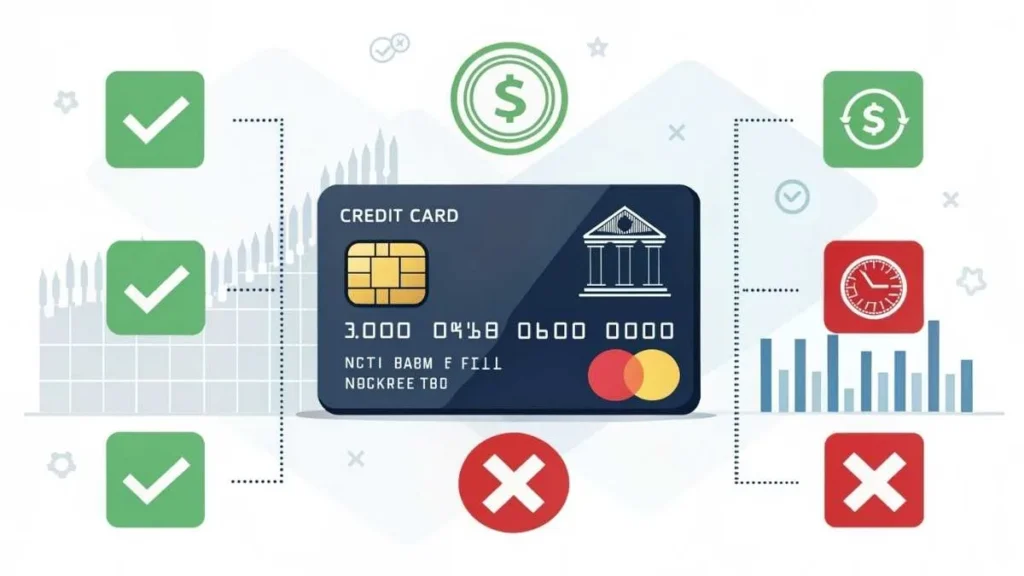
Credit cards can be powerful financial tools when used wisely—but they can also become debt traps if mismanaged. In the U.S., millions of people rely on credit cards for daily purchases, building credit history, and earning rewards. At the same time, credit card debt reached over $1 trillion in 2023, showing just how easy it is to fall into bad habits.
That’s why understanding the dos and don’ts of credit cards is so important. Practicing responsible credit card habits can help you build a strong credit score, avoid costly fees, and make the most of your financial opportunities. On the flip side, common credit card mistakes can hurt your credit and your wallet.
This guide breaks down the best practices for credit card use, the pitfalls to avoid, and practical steps you can take to keep your finances healthy.
Why Credit Card Habits Matter
When you swipe, tap, or insert your credit card, you’re essentially borrowing money from the card issuer. If you pay it back on time, you build trust (credit history) and may earn perks like cashback or travel points. If you don’t, you risk high-interest debt, late fees, and a damaged credit score.
Your credit card habits affect:
- Credit score (used for mortgages, car loans, even renting an apartment)
- Interest rates (lower scores = higher borrowing costs)
- Financial security (strong habits prevent fraud and debt)
Simply put: good habits open doors, while mistakes can close them.
Dos of Credit Cards
Here are the responsible credit card habits every cardholder should practice:
1. Pay Your Balance in Full and On Time
- Always pay at least the minimum due before the deadline, but aim to pay your full balance to avoid interest charges.
- Setting up autopay ensures you never miss a due date.
2. Monitor Your Credit Card Statements Regularly
- Review transactions at least once a week using your bank’s app.
- Catch errors, double charges, or fraud early before they become bigger issues.
3. Keep Credit Utilization Below 30%
- Utilization = your balance ÷ credit limit.
- Example: If your limit is $5,000, try to keep balances below $1,500.
- Lower utilization (ideally under 10%) is better for your credit score.
4. Take Advantage of Rewards Responsibly
- Cashback, points, and travel rewards are great—but only if you avoid carrying a balance.
- Don’t overspend just to chase rewards.
5. Use Alerts and Autopay Features
- Enable text/email alerts for due dates, large purchases, or low balances.
- Autopay gives peace of mind but still check statements for accuracy.
6. Review Credit Reports Annually
- Federal law allows one free report per year from each bureau (Equifax, Experian, TransUnion) at AnnualCreditReport.com.
- Spot inaccuracies that could hurt your score.
Don’ts of Credit Cards
These are the credit card mistakes to avoid if you want to stay financially healthy:
1. Don’t Max Out Your Credit Card
- A maxed-out card signals risk to lenders.
- Even if you pay on time, high balances drag down your credit score.
2. Don’t Miss Payments
- Missing just one payment can result in:
- Late fees (often $30–$40)
- Penalty interest rates (sometimes 29%+)
- A negative mark on your credit report
3. Don’t Apply for Too Many Cards at Once
- Each application triggers a hard inquiry, which lowers your score temporarily.
- Space out applications by at least 6 months.
4. Don’t Ignore Fraud Alerts or Suspicious Charges
- If you see a charge you don’t recognize, report it immediately.
- The Fair Credit Billing Act (FCBA) limits your liability to $50 for unauthorized charges.
5. Don’t Use Credit Cards for Cash Advances Unless Absolutely Necessary
- Cash advances often have:
- Higher interest rates than purchases
- Immediate interest (no grace period)
- Additional cash advance fees
6. Don’t Close Your Oldest Credit Card Without Considering Impact
- Length of credit history is about 15% of your FICO score.
- Closing your oldest account could shorten your history and hurt your score.
Why Following the Dos and Don’ts Matters
Good credit card habits help you:
- Build and maintain a strong credit score
- Qualify for better loans and lower interest rates
- Avoid falling into long-term debt
- Protect yourself against fraud
On the other hand, ignoring best practices can lead to:
- Thousands in interest payments
- Denied mortgage or car loan applications
- Stress and financial instability
Step-by-Step Guide to Building Healthy Credit Card Habits
Here’s how to put responsible practices into action:
Daily:
- Use your card for planned purchases, not impulse buys.
- Check your balance on your bank’s app.
Monthly:
- Pay your bill in full before the due date.
- Keep spending below 30% of your credit limit.
- Review your statement for errors.
Yearly:
- Pull free credit reports and dispute inaccuracies.
- Reevaluate whether your current card fits your spending habits.
Consumer Protection Tip
Credit cards offer built-in protections that debit cards often don’t:
- Fair Credit Billing Act (FCBA): You’re not responsible for more than $50 of unauthorized charges, and most issuers waive even that.
- Zero Liability Policies: Major networks like Visa and Mastercard protect you against fraud.
- Dispute Rights: You can challenge billing errors or merchant issues directly through your card issuer.
Tip: If you suspect fraud, call your issuer immediately and request a new card.
Read Also- First-Time Offense Credit Card Theft in Texas
FAQs About Credit Card Dos and Don’ts
What are the biggest mistakes people make with credit cards?
Missing payments, maxing out cards, and carrying high balances are the most common and damaging mistakes.
Should I carry a balance to build credit?
No. Carrying a balance does not help your credit score. Paying in full each month is the best practice.
How many credit cards should I have?
It depends. Many experts suggest starting with 1–2 cards and adding more only if you can manage them responsibly.
What’s a safe credit utilization ratio?
Aim to keep utilization below 30%, but the lower, the better. Staying under 10% is ideal for excellent credit.
Can I close a credit card I don’t use?
Yes, but be cautious. Closing your oldest account can shorten your credit history. Instead, consider keeping it open and making small purchases occasionally.
What should I do if I miss a payment?
Pay it as soon as possible, even if it’s late. Contact your issuer—they may waive the late fee if it’s your first time.
Final Thoughts
Credit cards are neither good nor bad—it all comes down to how you use them. Following the dos and don’ts of credit cards will help you avoid costly mistakes, build a solid credit history, and enjoy the benefits without the financial stress.
Think of your credit card as a tool: handle it with care, and it can help you build the financial future you want.

Emma Rose is a U.S.-based personal finance writer and a regular contributor at Cardix.us. She focuses on topics like credit cards, credit scores, and everyday money management. Emma’s writing makes complex financial concepts simple and practical, helping readers make smarter credit and spending decisions with confidence.


